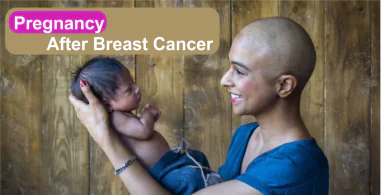Mrs. Dina (name changed), 27 old lady, who got married 4 months back, came me to enquire about the breast lump she had noticed few months ago. As with any breast lump, we performed a complete evaluation including a biopsy. It turned out to be breast cancer. The cancer seemed to be of early stage and curable. Being newly married the couples concern was ‘would she conceive in future?’
Breast cancer is a disease of older women especially after menopause. However, there are many exemptions. Time and again I see young women coming to me for breast cancer treatment. One of the biggest concerns in this age group is having children after treatment. Also remember that age plays a big role in patients’ future fertility. The age of the woman at the start of chemotherapy is the biggest predictor of infertility, older you are, less likely you are to conceive.
Is it possible to get pregnant after breast cancer treatment?
Yes, it is possible! However, there are a few hurdles. If a patient needs only surgery and radiotherapy, and no chemotherapy, the treatment will not impact on future fertility. Chemotherapy that is given for breast cancer may affect a woman’s ability to have a baby by damage to the ovaries, which can sometimes cause immediate or delayed infertility. Breast cancer patients treated with chemotherapy run the risk of developing premature ovarian failure or very early menopause. Almost four out of five women treated with cyclophosphamide, which is often-prescribed chemotherapy drug for treating breast cancer, develop ovarian failure
Some drugs can affect the functioning of heart (Anthracycline group). During pregnancy the load on heart increases and use of these drugs during chemotherapy could hamper women’s ability to cope.
To date, the best way to preserve fertility is to freeze embryos created by invitro fertilization. However, this is a costly affair.
Could pregnancy and breastfeeding make my breast cancer come back?
For many years it was believed that the risk of cancer coming back increases during pregnancy especially for patients with hormone receptor positive (ER positive) patients. During pregnancy the levels of estrogen increases. High hormone levels were thought to result in increased chance of the cancer coming back. Studies have shown, though, that pregnancy does not increase the risk of the cancer coming back after successful treatment. In fact there are reports that suggest a reduction in risk.
It is safe to breastfeed as well. There may be a reduction in milk production on the side of cancer. Also there may be difficulty for the baby to latch on due to structed changes. As such you can breastfeed, as long as you’re not receiving chemotherapy or hormonal therapy. In fact, some research suggests having a history of breastfeeding might actually lower the risk of the cancer coming back.
How long should you wait before trying for pregnancy?
What is the risk for baby in all this?
There is no proof that a breast cancer has any direct effect on her baby’s future risks. As the eggs in ovary a quite resistant to chemotherapy, we have found no increased rate of birth defects or other long-term health concerns in children born to women who have had breast cancer. The breastfeeding from the affected side is also safe for the baby.
As for hereditary cancers, only about 5% of cancers are hereditary. However, all patients under the age of 50 should undergo genetic test to understand their own risk profile. There is a 50% risk of passing on the genetic defect to your baby if you have a genetic mutation.
Can I breastfeed after breast cancer treatment?
If you have had breast surgery and/or radiation, you may have problems breastfeeding from the affected breast. Studies have shown reduced milk production in that breast as well as structural changes that can make breastfeeding painful, or make it difficult for the baby to latch onto the breast. Still, many women are able to breastfeed.
If you are still taking any medicines to treat your breast cancer (such as hormone therapy), it’s very important to talk with your doctor before trying to breastfeed. Some drugs can enter the breast milk and might affect the baby.

